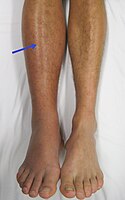
Photo from wikipedia
Coagulation biomarkers are being actively studied for their diagnostic and prognostic value in patients with venous thromboembolism and cancer, as well as in the study of pathogenic mechanisms between cancer… Click to show full abstract
Coagulation biomarkers are being actively studied for their diagnostic and prognostic value in patients with venous thromboembolism and cancer, as well as in the study of pathogenic mechanisms between cancer and thrombosis. For the results of such studies to be accurate and reproducible, attention must be paid to minimize sources of error in all phases of testing. The pre-analytical phase of laboratory testing is known to be fraught with the majority of errors. Coagulation testing is particularly susceptible to conditions during collection, processing, transport and storage of specimens which can lead to clinically significant errors in results. In addition, changes in pre-analytical conditions can impact different biomarkers differently. Therefore, research studies investigating coagulation biomarkers must carefully standardize not just the analytical phase, but also the pre-analytical phase of testing to ensure accuracy and reliability. We briefly review the impact of pre-analytical conditions on coagulation testing in general, and on specific biomarkers in cancer and thrombosis. In addition, we provide recommendations to reduce pre-analytical errors by developing and sharing standard operating procedures that specifically target standardization of methodologies for collecting specimens and measuring current and emerging coagulation biomarkers in cancer studies.
Journal Title: Thrombosis research
Year Published: 2020
Link to full text (if available)
Share on Social Media: Sign Up to like & get
recommendations!